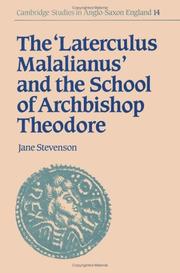| Listing 1 - 2 of 2 |
Sort by
|
Book
ISBN: 9782503533858 250353385X Year: 2010 Volume: 6 Publisher: Turnhout: Brepols,
Abstract | Keywords | Export | Availability | Bookmark
 Loading...
Loading...Choose an application
- Reference Manager
- EndNote
- RefWorks (Direct export to RefWorks)
Theodore of Tarsus served as archbishop of Canterbury for twenty-two years until his death in 690, aged eighty-eight. Because the only significant record we had of Theodore was that contained in Bede's Historia, until recently it was very difficult to say anything about his life before this appointment, and even more difficult to determine anything about his thought. All of that changed in the last half of the twentieth century, when the discovery of some biblical glosses from Canterbury was revealed and the ensuing scholarship uncovered more of Theodore's work than had previously been known. The Laterculus Malalianus is a text that benefited from treatment in this period. This present work examines the Laterculus for what it has to say about the person and work of Christ, and establishes that Theodore's main theological inspiration was Irenaeus of Lyons and the concept of recapitulation, even while he cast his thought in language heavily drawn from the Syriac East, and Ephrem the Syrian in particular. The volume represents a contribution to our understanding of the early medieval theological project in Britain, the transmission of eastern Mediterranean thought in the early medieval West and, ultimately, of the work of Theodore of Tarsus.

ISBN: 0521374618 0521036070 0511553056 9780521374613 9780511553059 9780521036078 Year: 1995 Volume: 14 Publisher: Cambridge Cambridge University Press
Abstract | Keywords | Export | Availability | Bookmark
 Loading...
Loading...Choose an application
- Reference Manager
- EndNote
- RefWorks (Direct export to RefWorks)
The Laterculus Malalianus, a historical exegesis of the life of Christ, appears to be the only complete text to survive from the hand of Archbishop Theodore at Canterbury. Its language, style and intellectual frame of reference are thus of great importance for establishing the nature and scope of teaching at Canterbury, the first school of Anglo-Saxon England. This edition, with translation and commentary, is the third volume in this series to offer a reassessment of Canterbury as a major seat of learning, together with Bernhard Bischoff's and Michael Lapidge's edition of the biblical commentaries from the Canterbury school and Michael Lapidge's edited collection of essays on the life and influence of Archbishop Theodore. In the introduction Jane Stevenson examines the intellectual milieu of this work, argues the case for attribution to Theodore, and suggests the need for a complete rethinking of the basis of Anglo-Saxon culture.
Anglo-Saxons --- Monasticism and religious orders --- Monachisme et ordres religieux --- Education --- History --- Histoire --- Theodore, --- St. Augustine's Abbey (Canterbury, England) --- Laterculus Malalianus --- England --- Angleterre --- Church history --- Histoire religieuse --- History. --- Laterculus Malalianus. --- Syon Abbey (Isleworth, London, England) --- England - Church history - 449-1066. --- Arts and Humanities --- Literature --- Monasticism and religious orders - England - Canterbury - Education - History --- Monasticism and religious orders - England - Canterbury - History - Middle Ages, 600-1500 --- Anglo-Saxons - England - Canterbury --- Saxons --- Monachism --- Monastic orders --- Monasticism and religious orders for men --- Monasticism and religious orders of men --- Orders, Monastic --- Orders, Religious --- Religious orders --- Brotherhoods --- Christian communities --- Brothers (Religious) --- Friars --- Monks --- Superiors, Religious --- Canterbury (England). --- Saint Augustine's Abbey (Canterbury, England) --- St. Augustine's Abbey, Canterbury, Eng.
| Listing 1 - 2 of 2 |
Sort by
|

 Search
Search Feedback
Feedback About UniCat
About UniCat  Help
Help News
News